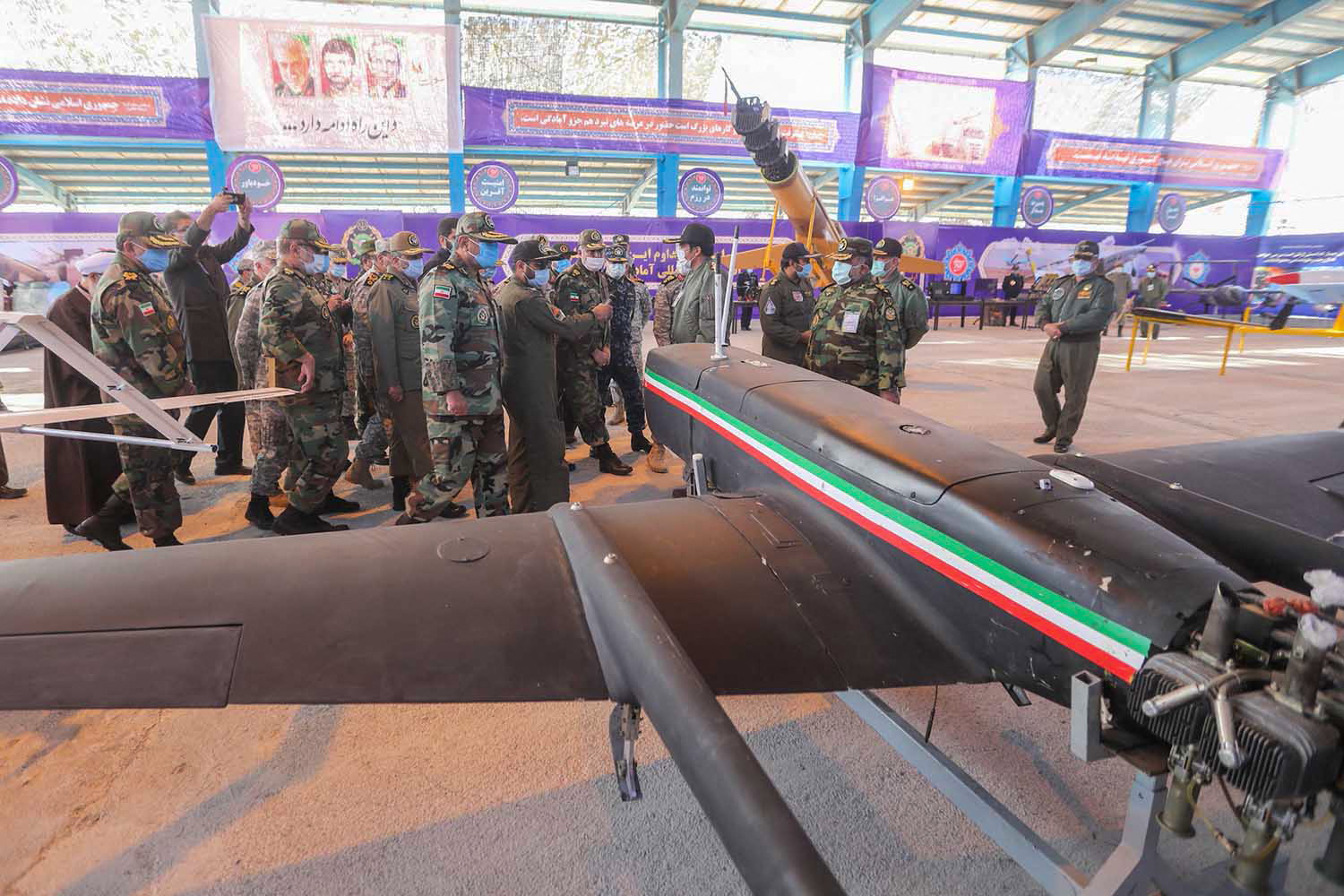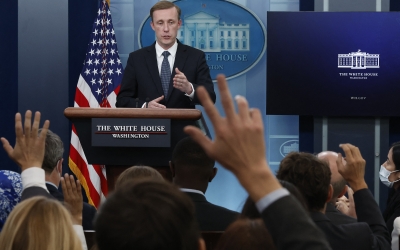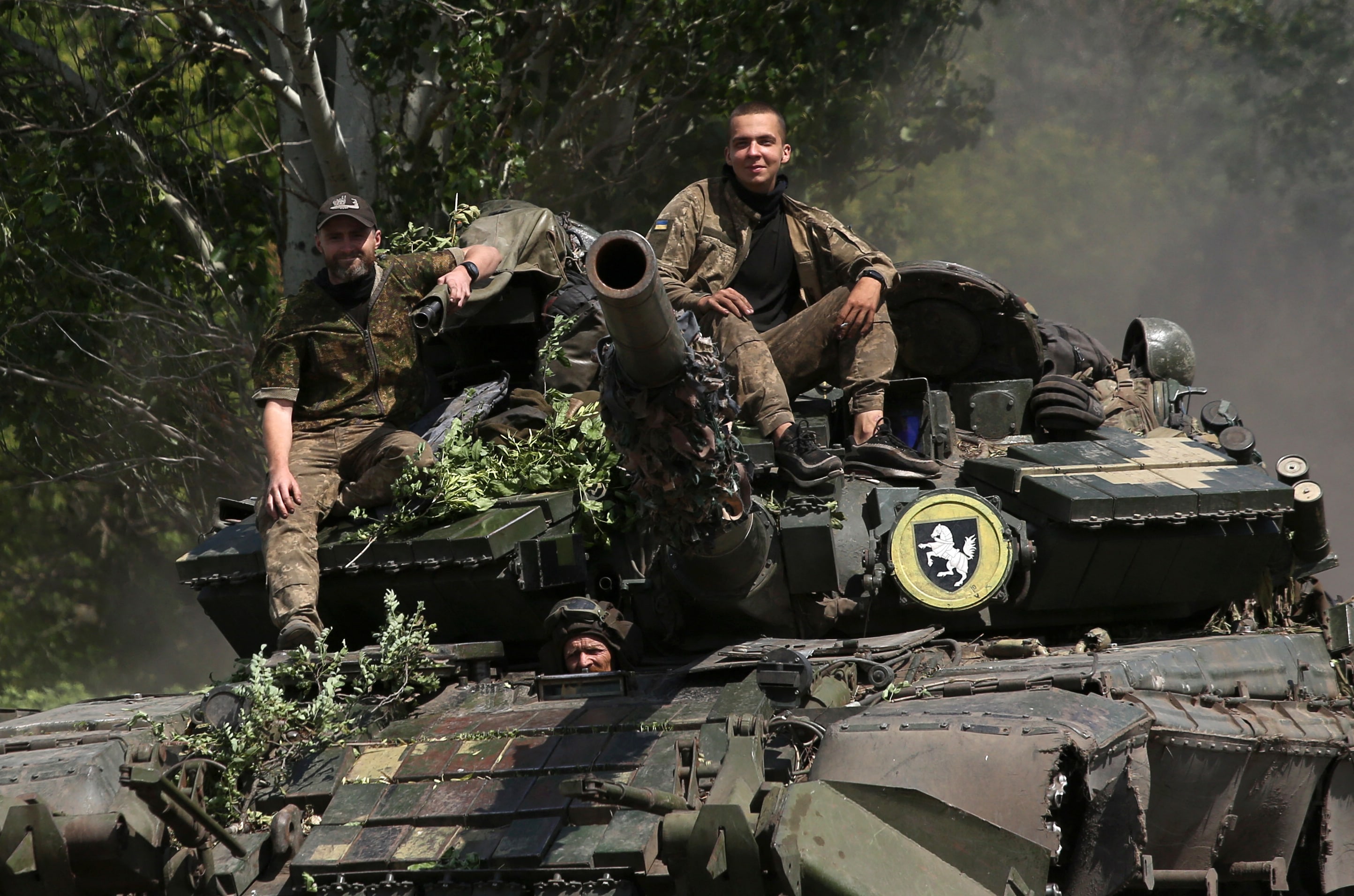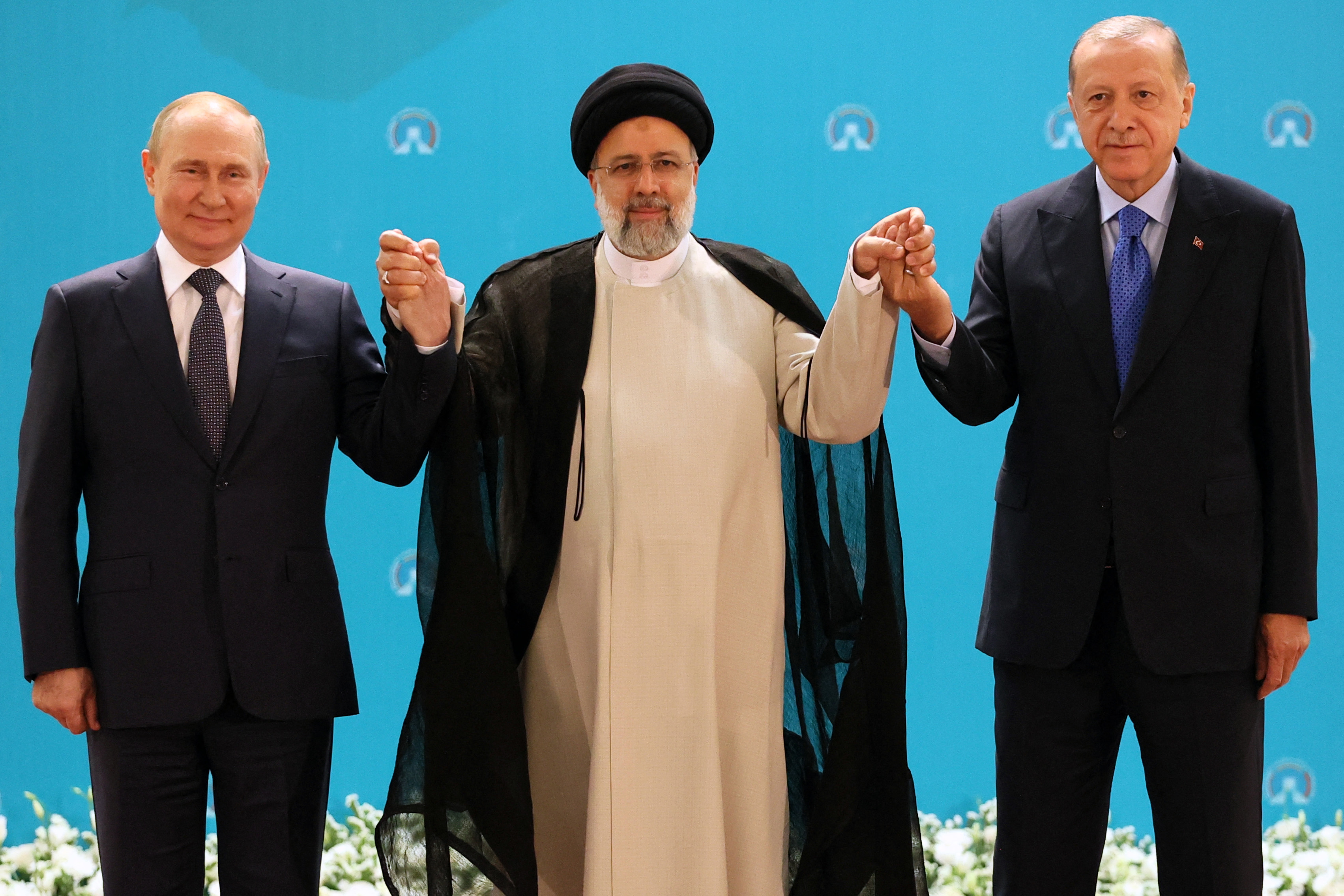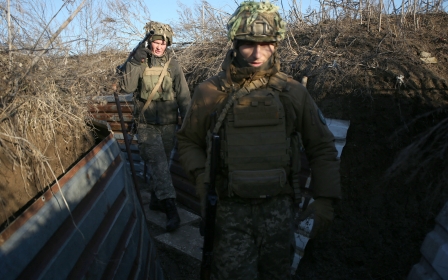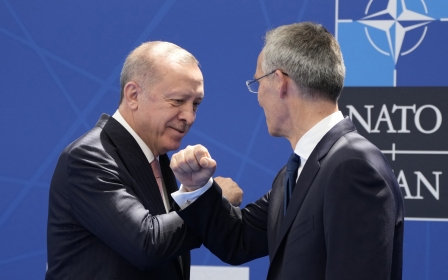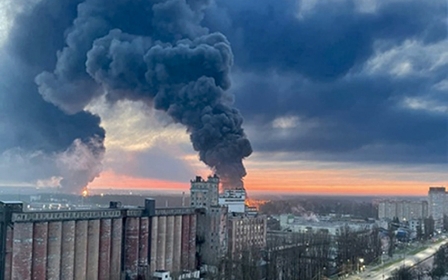Ukrainian fighters unfazed by Iran drone supplies to Russia
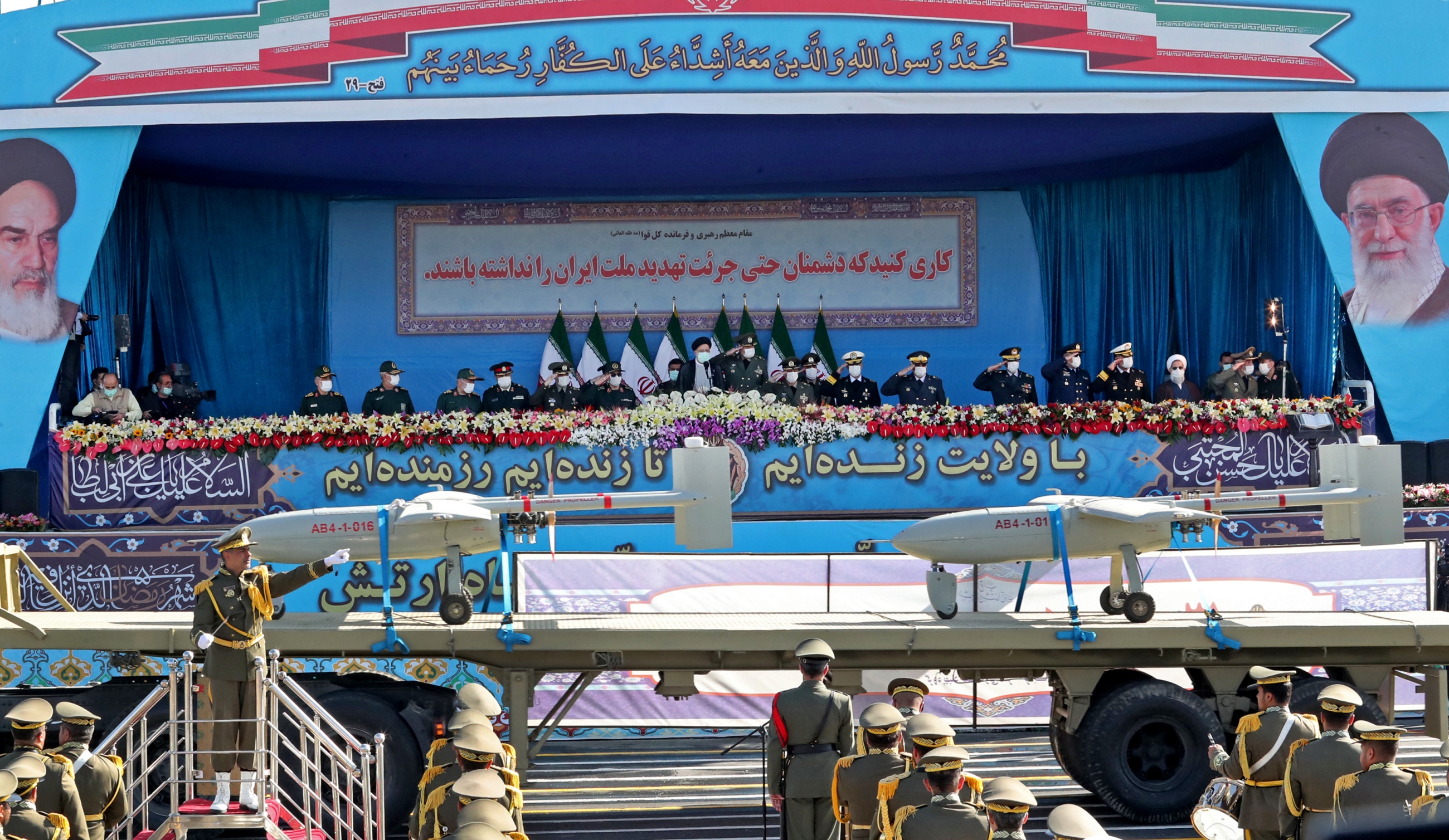
The buzz of Iranian drones overhead is not a new sound for "Cowboy," a former marine who worked in Iraq as a military contractor with US and Kurdish government agencies from 2019 up until this year.
His deployment coincided with a slew of drone attacks on US forces the White House attributed to Iranian-backed militias.
"The surveillance drones were a constant threat because they could bring in suicide drones," Cowboy told Middle East Eye in an interview over the messaging app Signal on the condition that he be identified only by his call sign.
Although Cowboy has left the Middle East, he is once again considering how to counter Iranian drones, albeit this time from Eastern Europe, as he makes his way across a country bordering Ukraine to volunteer as a fighter against Russia.
'I hope the Russian bastards have fun with their new Farsi drone manuals'
- Igor, Ukrainian fighter
"We had some man-portable systems similar to ones you see in Ukraine, but their usefulness is borderline placebo, as they are only effective to a few hundred meters or less," he said.
According to the US, Iran is preparing to send "hundreds" of armed and unarmed drones to support Russia's invasion of Ukraine. The White House says Iran could begin training Russian forces on the drones as early as this month.
Russia and Iran have neither denied nor confirmed US claims about drone shipments, and Iran's mission to the UN refused multiple MEE requests for an interview. But statements from both countries leave open the possibility of a deal.
Nasser Kanani, a spokesman for Iran's foreign ministry, said on Tuesday that "military cooperation between Iran and the Russian Federation on new technology predates Ukraine's war and has not had a significant change in recent times".
On Thursday, Russia's ambassador to Iran went further, saying there were "no limitations on military-technical cooperation" between Moscow and Iran.
The opportunity to supply drones to Russia would come at a time when Tehran has been ramping up its unmanned aerial vehicle (UAV) programme. In May, the country inaugurated its first foreign drone factory in neighbouring Tajikistan, and this month it unveiled new technology allowing its warships to launch drones from the sea.
Iran is far from the only Middle Eastern state using drones. Neighbouring Turkey has deployed them successfully in conflicts in Libya, Syria, and the Caucuses. Turkish Bayraktar TB-2 drones have also allowed Ukraine to hit Russian tanks and convoys, in addition to striking deep inside Russian territory.
Up until now, Iran's drones have mainly been sent to allies such as Lebanese Hezbollah, Shia militias in Iraq and Houthi rebels in Yemen. Sending drones to Russia for combat in Ukraine would put Tehran in a whole new league, analysts say.
'I don't think Iranian drones prove to be more of a threat than whatever else Russia would be fielding instead'
- Former US military contractor en route to Ukraine
"Iran has been in the drone industry for a long time, but it has never supplied drones to a superpower," said Arthur Holland Michael, a drone expert at the Carnegie Council.
He called the potential deal "an unprecedented development" for Iran's drone industry.
Behnam Ben Taleblu, an Iran expert at the Washington-based Foundation for Defense of Democracies, echoed those thoughts. He told MEE that supplying drones to Russia could turbocharge Iran's drone efforts, putting the country on the map as a global exporter.
"This would be the most significant state-to-state transfer of Iranian arms in the Islamic Republic's history," he said.
'Feeling chuffed'
It would also mark a reversal in Iran's traditional relationship with Russia, where the Kremlin is usually the one bringing the firepower to bear.
In Syria, the combination of Russian air power and military advisers with Iranian ground forces turned the tide of the Syria war in favour of the government of Bashar al-Assad.
"If I'm the Iranians right now, I have to be feeling pretty chuffed that for the first time I'm the trainer and not the trainee with the Russians," Mark N Katz, professor at George Mason University and an expert on Russian relations in the Middle East, told MEE.
Russia is the second-largest exporter of arms behind the US, but Moscow's defence industry has been crippled by western sanctions and export controls.
US officials have wasted no time pointing out the irony that Russia is now turning to the Middle East for arms. CIA director Bill Burns said it reflected "the deficiencies of Russia's defense industry".
Meanwhile, Iran has excelled in churning out combat drones made with cheap, commercially available components under one of the world's toughest sanctions regimes.
Igor, a Ukrainian fighter and former drone commander who spoke with MEE on the condition that his last name be withheld out of security concerns, says he is familiar with Iran's drones from footage of them in Iraq.
"You can tell the Iranian drones are cheaply made, but they seem effective," he said.
Iran's drones have emerged as one of the biggest threats to US forces and their allies in the Middle East. Last year the top US military commander in the region warned that because of drones the US was operating without complete air superiority for the first time in decades.
Iran is believed to be behind a string of high-profile drone attacks.
The US accused Tehran of orchestrating the daring 2019 strike on Saudi Arabia's oil facilities. Drones launched by Iran-aligned Houthi rebels in Yemen hit Abu Dhabi earlier this year. The US and European countries also blamed Tehran for a drone attack last summer on an Israeli-flagged oil tanker near the coast of Oman. Iran has denied any role in the attacks.
Yet Iranian drones have not been deployed to a conventional battlefield like Ukraine.
"Iran's drones have all hit static targets. They are focused on infrastructure and have a limited payload," Michael Pregent, a former US intelligence officer who served in Iraq and as a top Middle East policy official at the Pentagon, told MEE. "Will they be effective against a tank?"
Iranian drones have done well in the Middle East in part because, while they fly low to the ground, they sometimes arrive at their targets undetected.
In its report on the 2019 Saudi Arabia oil facility attack, the UN concluded that drones entered from the north of the country, as opposed to Saudi Arabia's southern border with Yemen, where most of the kingdom's radar and missile defence systems are focused.
In Ukraine, Iranian drones will be operating in a high-intensity battlefield where air defence artillery, jamming equipment and radar are much more ubiquitous. And the Ukrainian military is already accustomed to taking counter-measures against Russian drones, which Pregent says are more sophisticated.
"The Russians who get trained up on Iranian drones are going to realise just how desperate they are to be actually using these things," he said. "This is a step down for the Russian army."
Putin's balancing act
But analysts say Moscow may be out of options. The country is running low on combat drones and "loitering" munitions, better known as kamikaze drones. And the Kremlin's supplies are dwindling just as western arms shipments to Ukraine are picking up.
Samuel Bendett, a specialist on Russian weapons at CNA, a research and analysis organisation in Arlington, Virginia, told MEE that under the circumstances Russia is not going to be picky
"The Russians aren't going to make the perfect the enemy of the good. They need a drone that is capable and will accomplish the mission."
Cowboy, the former US military contractor who faced Iranian drones in Iraq, said he doesn't believe the drones will give Russia a strategic edge. "All in all, I don't think Iranian drones prove to be more of a threat than whatever else Russia would be fielding instead."
Meanwhile, Igor, the former Ukrainian drone operator, said: "I hope the Russian bastards have fun with their new Farsi drone manuals. Good luck to them trying to read that."
Battlefield bravado aside, drone shipments from Iran to Russia might have more of an impact off the battlefield, particularly in the Middle East, if they are viewed as a sign that Moscow is becoming dependent on Iran for military assistance.
"You can just bet that the Gulf Arabs and the Israelis are watching this development oh so closely," Katz, at George Mason, said.
Russia has boosted its clout in the Middle East due in part to its ability to maintain good relations with all players in the region.
While it is allied with Iran in Syria, it also maintains a deconfliction line with Israel and allows the Israelis to strike Iranian targets in the country with near impunity.
Even as he has leaned on closer ties with Iran amid western isolation, Russian President Vladimir Putin has continued to cultivate Saudi Arabia's Crown Prince Mohammed bin Salman, especially for cooperation on energy.
If Russia becomes viewed as too dependent on Iran, it may upset the Kremlin's ability to manoeuvre between so many opposing sides. Iranian officers training the Russians how to fly drones could be the kind of development to put Jerusalem and Riyadh on alert, analysts say.
"At what point would Iranian training and equipment to Russia become seen as a problem for Gulf Arabs and the Israelis?" Katz said. "And is payment to Iran for the drones some degree of greater support in the Middle East?
"Putin has been juggling with all these countries. This could be the beginning of the start when he struggles to keep all his balls in the air at the same time."
Middle East Eye propose une couverture et une analyse indépendantes et incomparables du Moyen-Orient, de l’Afrique du Nord et d’autres régions du monde. Pour en savoir plus sur la reprise de ce contenu et les frais qui s’appliquent, veuillez remplir ce formulaire [en anglais]. Pour en savoir plus sur MEE, cliquez ici [en anglais].


